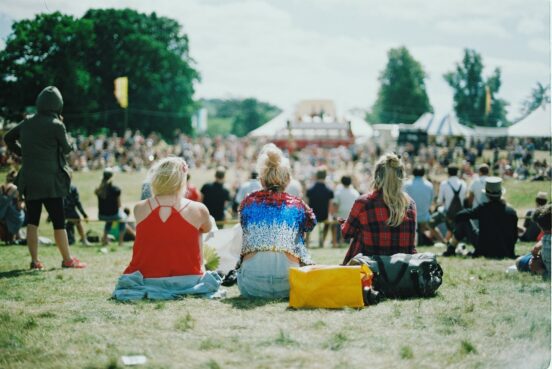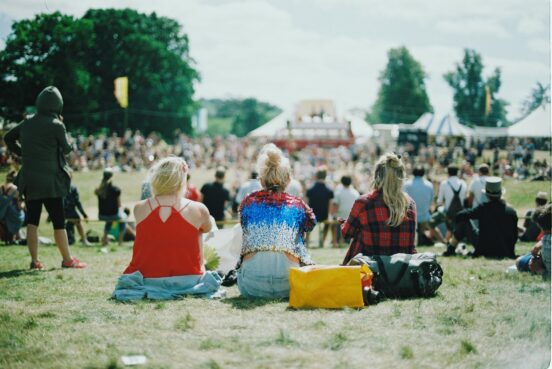This project is funded by ESRC Impact Accelerator Grant and DDI BEACON Build Back Better Open Call
In the summer of 2019 the Culture & Communities Mapping Project coordinated three cultural mapping workshops with artists, creative freelancers and art institutions in town – this was part of a larger project to understand local cultural geographies outside of the city centre. One of the themes that emerged from the workshops was gentrification and how it impacted local artists. Edinburgh has branded itself as a tourist destination across the world, and the festivals have been a major part of that image. Many local artists and freelancers, on the other hand, experience the downsides of this – the rising rents because of Airbnb, or spaces taken away from art communities by the major commercial festival organisations who use them for storage eleven months out of the year. Another theme that emerged from discussions was the uneven distribution of cultural resources across the city – that entire neighbourhoods have very low festival attendance and little support for cultural infrastructure in their areas, aside from a few essential cultural hubs that service these communities.
When COVID-19 hit, we interviewed several of these community hubs – granton:hub, WHALE Arts, North Edinburgh Arts, LeithLate, along with Summerhall, the Council, the International Book Festival and Creative Edinburgh, to ask them how they were managing during lockdown. What came through is that these local institutions are vital – in some cases they provided free food and even internet-connected devices to people without internet who would otherwise be entirely isolated. What also emerged from these discussions is that the pandemic was a time to reset things, to rethink how Edinburgh approaches its cultural policy. Should it be so outward facing? Is it environmentally sustainable to continue a growth model that asks people to get on airplanes and fly in from around the world to watch theatre?
This project, The Festivals and Communities Map, came out of this sense that the city has an opportunity to rethink its strategy and look more locally, particularly towards regional artists and communities that have traditionally not benefited, at least not directly, from Edinburgh’s role as The Festival City.
Josh Ryan-Saha, the Director of Travel Tech for Scotland, introduced us to Lyndsey Jackson, director of the Edinburgh Festival Fringe. Lyndsey, along with Julia Amour, who heads Festivals Edinburgh, were both very sympathetic to these ideas and agreed to work with us on the bid for COVID-recovery funds, based on the concept of local cultural dispersal. The approach we landed on was an interactive map that would show where Edinburgh’s paying ticket buyers lived, where the city’s most deprived communities are according to the Scottish Index of Multiple Deprivation, and where Festivals already had ties with local community groups. From there, we could begin to see other spaces that Festivals could reach out to through their community programs going ahead. These are also areas where the city could offer more support generally for cultural infrastructure.
From the map we focused on four parts of town that fit this profile: Oxgangs, Lochend/Restalrig, Liberton and Granton. We organised cultural mapping workshops with community organisations in these areas to hear residents’ ideas about the spaces they value in their area and the kind of events they would like in their neighbourhood, and what role they could see Festivals playing for their community. We also held similar workshops with two other communities, Westerhailes, through WHALE Arts, and Muirhouse, through North Edinburgh Arts, which already have strong ties to several of the festivals. The workshops reached 70 people in total.
The map shows starkly that the most deprived areas do not purchase festival tickets – not much of a surprising finding. But the map also does more. We’ve also received data from The List showing where cultural events took place in 2018 – this gives you a sense of year-round footfall traffic in town, in pre-COVID times. Events concentrate in Old Town and Newington, with a satellite area of activity in Leith. Some neighbourhoods have no events listed at all, which, especially if these are more deprived areas, will have an impact on the ability of people in these areas to access cultural activities. We’ve also mapped 2021 data on Airbnb rentals, which, unsurprisingly, is saturated in the centre, but it also paints a clear picture of the role that Leith now plays in the short-term let industry, and explains, in part, the rising rents in this area.
The map is nearing completion, and we’ll be sharing it with Festivals for their feedback this month, before releasing it to the public on our website. We’re also designing local maps based on the cultural mapping workshops in the six communities we worked with, along with reports for each area, which will have recommendations for local cultural programming and festival ideas tailored to these communities.
For updates on this project, please check out our Instagram account: edinburghculturalmap or visit www.edinburghculturalmap.org
Team
Morgan Currie is Lecturer in Data and Society in Science, Technology and Innovation Studies. She is principal investigator of The Culture & Communities Mapping Project and co-lead the Digital Social Science Research Cluster at Centre for Data, Culture & Society.
Josh Ryan-Saha is the Director of Traveltech for Scotland, a business cluster organisation getting behind Scotland’s Traveltech pioneers. He works at the University of Edinburgh, Edinburgh Futures Institute where he leads on the application of data-driven innovation for the tourism and festival sectors. He previously worked at The Data Lab where he led programmers to improve data science skills across Scotland. He joined from Nesta where he established the £10m Longitude Prize, that featured on BBC Horizon’s 50th Anniversary Episode. Prior to joining Nesta in October 2013, Joshua worked in Bosnia and Herzegovina developing and delivering projects related to constitutional reform and reconciliation.
Melisa Miranda-Correa is a Chilean architect with an MPhil in Landscape Architecture (ESALA) at the University of Edinburgh and is currently a PhD candidate in the same program. Her research focuses on decolonised methodologies, action research as mapping experiences, and linguistic landscapes as a political economy of places.
Vikki Jones is a PhD Researcher at Edinburgh College of Art (ECA) and a Research Assistant for the Culture and Communities Mapping project. Her work examines the value of digital labour and practice in the arts and creative industries. She is currently investigating how cultural organisations and spaces are responding to the COVID-19 pandemic.
(Photo by Aranxa Esteve on Unsplsh )
(Photo by Aranxa Esteve on Unsplsh )











Comments by Ritti Soncco